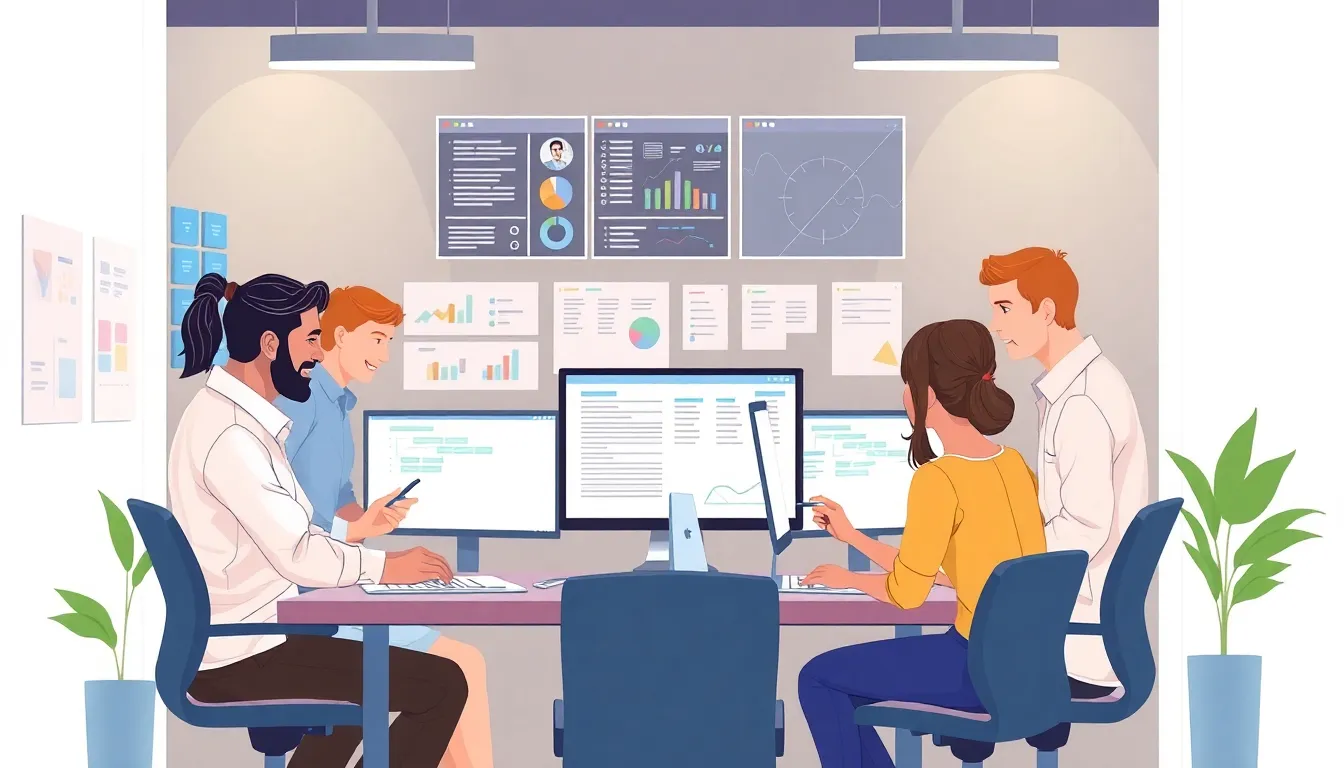In the fast-paced world of technology, the role of an Azure DevOps Engineer is like the secret sauce that makes everything taste better. Picture a chef who not only knows how to whip up a gourmet meal but also ensures the kitchen runs smoothly. That’s what Azure DevOps Engineers do—they blend development and operations to create a seamless workflow that keeps projects on track.
With the rise of cloud computing, these engineers are in high demand. They’re the superheroes of the tech realm, wielding tools like Azure Pipelines and Azure Repos to automate processes and enhance collaboration. If you’ve ever wondered who’s behind the curtain making sure your favorite apps run without a hitch, look no further. The Azure DevOps Engineer is the unsung hero, turning chaos into order, one deployment at a time.
Table of Contents
ToggleOverview of Azure DevOps Engineer
Azure DevOps Engineers play a pivotal role in bridging the gap between development and operations. Their work fosters collaboration and streamlines workflows within development teams.
Role and Responsibilities
Azure DevOps Engineers manage the end-to-end software development lifecycle. They implement CI/CD pipelines using Azure Tools. Responsibilities include automating deployments, monitoring application performance, and enhancing system reliability. Collaboration is critical as they facilitate communication between development teams and IT operations. Additionally, they ensure that all team members adhere to best practices in version control and code quality. Their expertise helps identify bottlenecks in processes, enabling teams to deliver high-quality software on time.
Required Skills and Qualifications
Azure DevOps Engineers benefit from a blend of technical and soft skills. Proficiency in Azure cloud services ranks high among these skills. Familiarity with tools like Git and Jenkins is essential for version control and continuous integration. Strong scripting abilities in languages like Python or PowerShell are valuable for automation tasks. Communication skills also hold importance, assisting engineers in collaborating effectively with diverse teams. Additionally, having a background in software development or IT operations strengthens their qualifications, making them suitable for addressing complex technical challenges.
Tools and Technologies Used

Azure DevOps Engineers leverage a variety of tools and technologies to streamline their workflows. These resources enhance productivity and ensure effective collaboration across teams.
Azure DevOps Services
Azure DevOps Services offers a suite of tools for software development. It provides frameworks for project management, version control, and automated testing. With Azure Boards, teams track work with customizable dashboards and Kanban boards. Azure Repos supports Git repositories, enabling effective version control. Azure Test Plans allows practitioners to create and manage test cases, ensuring quality assurance throughout the development process.
CI/CD Pipelines
CI/CD Pipelines play a crucial role in the DevOps methodology. Continuous Integration ensures that developers can merge code changes frequently, minimizing integration conflicts. Automated builds and tests are executed with each commit, which identifies errors early. Continuous Deployment automates the release process, ensuring that updates are delivered to users quickly and reliably. Azure Pipelines enables implementation of CI/CD practices, supporting various programming languages and cloud platforms, thereby fostering a seamless deployment experience.
Best Practices for Azure DevOps Engineers
Azure DevOps Engineers play a vital role in streamlining processes and ensuring efficiency within teams. Adopting best practices enhances productivity and strengthens collaboration across projects.
Collaboration and Communication
Effective collaboration among team members remains essential. Utilizing tools such as Azure Boards facilitates transparency and keeps everyone aligned on project progress. Frequent stand-up meetings promote engagement and address potential roadblocks early. Trust among team members fosters an environment where ideas flow freely. Continuous feedback loops help identify improvements in workflows, leading to higher quality outcomes. Regularly updating documentation ensures that all team members stay informed about ongoing changes and practices.
Security and Compliance Measures
Implementing security measures is critical in Azure environments. Regularly reviewing access permissions limits exposure to sensitive data. Utilizing Azure Security Center helps identify vulnerabilities, allowing for proactive risk management. Encryption protocols safeguard data both at rest and in transit, ensuring compliance with industry regulations. Automated compliance checks streamline audits and maintain adherence to standards. Encouraging a culture of security awareness within teams enhances overall protection against threats.
Career Path and Opportunities
Azure DevOps Engineers enjoy a range of career opportunities in an expanding field. As organizations continue to adopt cloud-based solutions, the demand for skilled professionals grows rapidly.
Certification Options
Certification provides a significant boost to an Azure DevOps Engineer’s career. Options like the Microsoft Certified: Azure DevOps Engineer Expert validate skills in implementing DevOps practices using Azure technologies. Additionally, certifications such as the Microsoft Certified: Azure Solutions Architect Expert can enhance credibility in cloud architecture. Others, including foundational certifications like Microsoft Certified: Azure Fundamentals, introduce core knowledge for budding engineers. Pursuing these certifications establishes expertise and enhances job prospects in a competitive marketplace.
Job Market Outlook
The job market for Azure DevOps Engineers remains robust. Recent trends indicate a compound annual growth rate of 20% in cloud computing jobs by 2025. Organizations across various sectors seek engineers proficient in automation and continuous integration practices. Potential employers include tech companies, financial institutions, and healthcare organizations, reflecting a diverse job landscape. High salaries and strong demand reinforce this career path’s appeal. Engaging in continuous learning and certification increases competitive advantages and opens new opportunities in this dynamic field.
Azure DevOps Engineers play an indispensable role in today’s tech landscape. Their ability to blend development and operations ensures that software projects progress smoothly and efficiently. As organizations increasingly embrace cloud solutions the demand for these skilled professionals continues to rise.
With their expertise in Azure tools and best practices they’re equipped to tackle complex challenges while fostering collaboration across teams. As the job market evolves continuous learning and certification will be crucial for those looking to thrive in this dynamic field. The future looks bright for Azure DevOps Engineers as they contribute to innovative solutions that drive business success.






